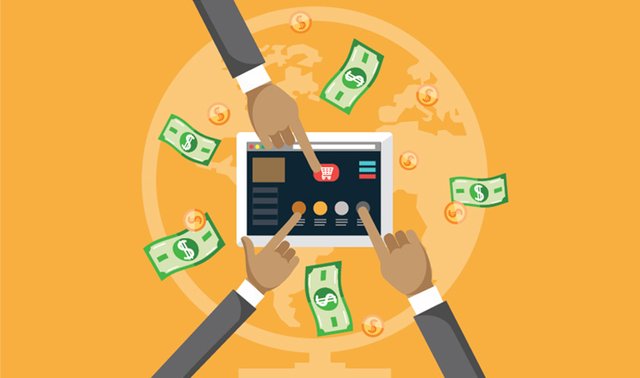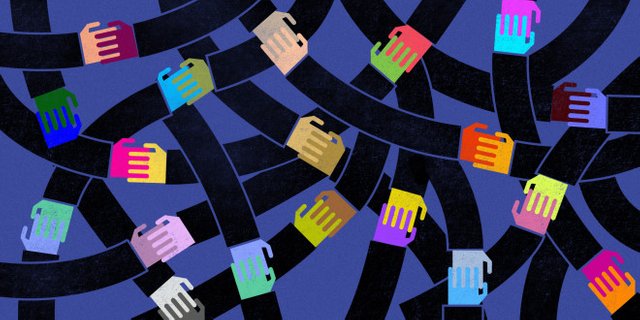Blockchain Is Killing The Middleman - Real Trust In A Virtual World
When you vote have you ever wondered if your ballet is actually counted? If you meet someone online how do you know they are actually who they say they are? When you buy coffee that's labeled fair-trade, what makes you so certain of it's origin?

Online Trust
To be sure, really sure, you'd need a system where records could be stored, facts could be verified by anyone and security is guaranteed in a way that no one could cheat the system by editing records because everyone using the system would be watching.Systems like this are on the horizon and the software that powers them is called a blockchain.
Blockchains store information across a network of computers making them not just decentralized but distributed. This means no central person or entity owns the system, yet everyone can use it and help run it. This is important because it means it's difficult for any one person to take down the network or corrupt it.
The people who run the system use their computer to hold bundles of records submitted by others, known as blocks in a chronological chain. The blockchain uses a form of math called cryptography to ensure that records can't be counterfeited or changed by anyone else.
You've probably heard of the blockchain's first killer app, a form of digital cash called BitCoin that you can send to anyone, even a complete stranger.
BitCoin is different from credit cards, PayPal or other ways to send money because there isn't a bank or financial middleman involved. Instead, people from all over the world help move the digital money by validating other's BitCoin transactions with their personal computers, earning a small fee in the process.
BitCoin uses the blockchain by tracking ownership of this digital cash so only one person can be the owner at a time so the cash can't be spent twice.
BitCoin is just the beginning for blockchains. In the future blockchains that manage and verify online data could enable us to launch businesses that are entirely run by algorithms making self-driving cars safer, help us protect our online identities and even track the billions of devices on the internet of things.
These innovations will change our lives forever and it's all just beginning.

Banksters Interrupted
Modern technology allows people to communicate directly. Voice and video calls, emails, pictures and instant messages travel directly from A to B, maintaining trust between individuals no matter how far apart they are.
When it comes to money, people have to trust a third party to be able to complete a transaction. Blockchain technology is challenging the status quo in a radical way. By using math and cryptography blockchain provides an open, decentralized database for anything providing value.
Money, goods, property, work or even votes, can be exchanged creating a record whose authenticity can be verified by the entire community.
The future global economy will move towards one of distributed property and trust where anyone with access to the internet can get involved in blockchain based transactions and third-party trust organizations may no longer be necessary.
The uses of blockchain technology are endless. Some expect that in less than ten years it will be used to collect taxes. It will make it easier for immigrants to send money back to countries where access to financial institutions is limited. Financial fraud will be significantly reduced as every transaction will be recorded on a public and distributed ledger. which will be accessible by anyone who has an internet connection.
Think of it as wills and contracts that execute themselves or dated proof of existence for ideas, much like a patent.
Blockchain will become a global, decentralized source of trust but not everyone is ready to embrace it. A huge proportion of trust services from banking to notaries, will face challenges on price, volume and in some cases their very survival.
Public authorities could find it more and more difficult to enforce traditional financial regulations due to the new possibilities offered by the bitcoin network to bypass traditional financial intermediaries. Unimagined new networks will evolve to meet society's needs more cheaply and potentially more securely.
Will governments, financial and legal institutions embrace blockchain? What will happen to the ones who don't?
Related Posts
Bitcoin Vs Banks Technological Disruption Can Revolutionize Banking
Today I Learned More About BitCoin And Blockchain Technology
Five Ways Smart Contracts On A Blockchain Are Changing The Way We Do Business

Good post man.... I am learning more every day. #BlockchainEverything lol
Me too. I'm learning more everyday.
I never thought that one day we can collect the tax by cryptocurrency technology ;)
Blockchain technology could also be used to tally votes, democratically fund public works and hold leaders accountable.